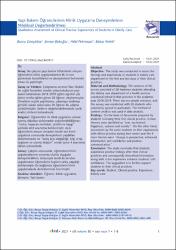Yaşlı bakımı öğrencilerinin klinik uygulama deneyimlerinin niteliksel değerlendirilmesi
Künye
Genckose, B., Bakoglu, E., Pekmezci, H. & Kefeli, B. (2021). Yaşlı Bakımı Öğrencilerinin Klinik Uygulama Deneyimlerinin Niteliksel Değerlendirilmesi. STED/Sürekli Tıp Eğitimi Dergisi, 30(1), 1-8. https://doi.org/10.17942/sted.860317Özet
öğrencilerin klinik uygulamalarının ilk ve son
günlerinde hissettiklerini ve deneyimlerini belirlemek
amacı ile yapılmıştır.
Gereç ve Yöntem: Çalışmanın evrenini Rize ilindeki
bir sağlık hizmetleri meslek yüksekokulunun yaşlı
bakım bölümünde 2018-2019 eğitim öğretim yılı
birinci sınıfta eğitim gören 28 öğrenci oluşturmuştur.
Örneklem seçimi yapılmamış, çalışmaya katılmayı
gönüllü olarak kabul eden 20 öğrenci ile çalışma
yürütülmüştür. Verilerin değerlendirilmesinde içerik
analizi yöntemi kullanılmıştır.
Bulgular: Öğrencilerin ilk klinik uygulama sonrası
yazmış oldukları dokümanlar değerlendirildiğinde;
“korku, heyecan-mutluluk, üzüntü ve kaygı”
şeklinde dört ana tema belirlenmiştir. Aynı
öğrencilerin mezun olmadan önceki son klinik
uygulama sonrasında deneyimlerini yazdıkları
dokümanlarda ise “bakış açısı değişikliği, bilgi artışı,
özgüven ve olumlu iletişim” olmak üzere 4 ana tema
dikkat çekmektedir.
Sonuç: Çalışma sonucunda, öğrencilerin klinik
uygulamalarının sonunda olumlu duygular
deneyimledikleri, dolayısıyla teorik ile beraber
uygulamanın öğrencilerin özgüven artışı yaşadığı
belirlenmiştir. Bu bağlamda öğrencilerin klinik
uygulamalarda desteklenmesi önerilmiştir. Objective: This study was conducted to assess the
feelings and experiences of students in elderly care
department in the first and last days of their clinical
practices.
Material and Methodology: The universe of the
survey consisted of 28 freshmen students attending
the elderly care department of a health services
vocational school in Rize province in the academic
year 2018-2019. There was no sample selection, and
the survey was conducted with 20 students who
voluntarily agreed to participate. The method of
content analysis was used in data analysis.
Findings: On the basis of documents prepared by
students following their first clinical practice, 4 main
themes were identified as “fear, excitementhappiness, sadness and anxiety”. On the other hand,
documents by the same students on their experiences
with clinical practice during their senior year the 4
main themes were “change in perspective, enhanced
information, self-confidence and positive
communication.”
Conclusion: The study concludes that students
experience positive feelings after their clinical
practices and consequently theoretical information
along with richer experience enhance students’ selfconfidence. The suggestion is to further support
students in their clinical practices


















